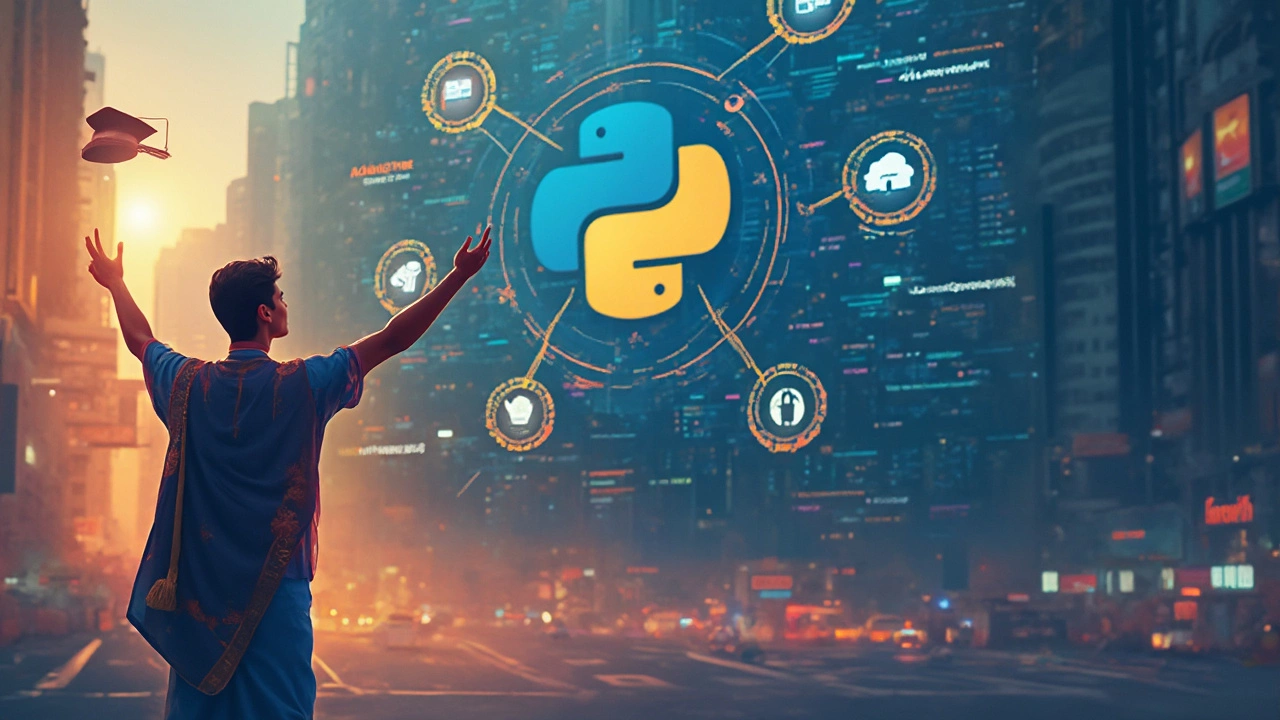Python’s everywhere—like, seriously everywhere. You see it in app development, machine learning projects, even simple automation scripts. If you’ve ever scrolled through job boards for tech roles, Python’s name just keeps popping up. It almost feels like you could focus only on Python and be set for life. But is it really that simple when it comes to getting a job?
Let’s talk about the job hunt in the real world. Sure, Python is easy to learn, and it’s incredibly popular. Companies love it because there’s less code to write and it’s super readable. That’s cool, but hiring managers often want a little more. Sometimes they want proof you can use Python on real projects, or maybe know some tools that go with it. If you think Python is your golden ticket, hang on. There are a few more things you need to know first.
- Why Python Keeps Popping Up in Job Listings
- What Python Can Actually Do (and Where It Falls Short)
- What Employers Really Want Besides Python
- Real Stories: People Who Got Hired with Just Python
- Boosting Your Chances: Skills to Pair with Python
- Is Python Alone Enough—or Just a Good Start?
Why Python Keeps Popping Up in Job Listings
If you look up tech job openings pretty much anywhere, Python is all over the place. It’s not a coincidence—there are some really practical reasons for it. The language is designed to be readable and simple, so it’s perfect for beginners and pros who want to get stuff done fast. Developers use Python for everything from websites to automation, data science, and even artificial intelligence.
One thing that makes Python stand out: it has a massive library system. You don’t have to code everything from scratch. Want to analyze data? Check out Pandas or NumPy. Want to build a website? There’s Django and Flask. Machine learning? TensorFlow and PyTorch have you covered. So companies know that someone who’s comfortable with Python can jump into lots of different projects.
It’s not just about versatility. Take a look at this table—here’s why Python dominates:
| Field | Top Python Use |
|---|---|
| Web Development | Backend scripting, APIs |
| Data Science | Data analysis, visualization, reporting |
| Machine Learning | Model building, automation |
| Automation | Task scripting, bots |
| Education | Beginner projects, teaching basics |
And here’s a wild fact: in the 2024 Stack Overflow Developer Survey, Python landed in the top three most popular programming languages worldwide. You see it on top-paying skill lists too. Companies know that a coder who lists Python has probably solved real problems and used today’s trending tech.
It doesn’t hurt that a ton of schools and coding bootcamps teach Python first these days. So there’s always fresh talent graduating, job listings keep asking for it, and project teams naturally reach for it because it just works. That’s why Python keeps popping up—and probably why you keep running into it in every other job post.
What Python Can Actually Do (and Where It Falls Short)
Python stands out in tech because you can use it for a ton of things—websites, automation, data analysis, even game development. It's counted as one of the top three programming languages on job sites right now. Want to know where it really shines? Data science, backend web development, machine learning, and scripting are huge. Python works with famous frameworks and libraries like Django, Flask, Pandas, TensorFlow, and NumPy—making complicated stuff easier and way faster to build.
Here’s a quick look at areas where Python has a big impact:
- Web development: Used with frameworks like Django and Flask for websites and web apps.
- Data science/AI: Tools like Pandas, NumPy, and TensorFlow run most machine learning and data-analysis jobs.
- Automation and scripting: Writing scripts to automate boring tasks—think file organization, reports, scraping data.
- Game development: Not super common but possible, mostly for prototypes or small games with Pygame.
Python is also a favorite for teaching beginners, since it looks more like plain English and doesn’t hit you with rules from the start.
| Industry | Example Use for Python | Estimated Job Share (%) |
|---|---|---|
| Data Science/Analytics | Data mining, model building | 35% |
| Web Development | Web app backends with Django | 27% |
| Automation/Scripting | Process automation tools | 20% |
| Testing/QA | Writing automated test scripts | 10% |
| Other (IoT, Games) | Prototyping, device interactions | 8% |
But Python’s got some weak spots, too. You don’t see it much in mobile app development—the big names there are Kotlin, Java, and Swift. Same with high-speed gaming or big-number crunching (like engines for video games or low-level hardware stuff)—C++ and Rust are more common because they’re just faster. When it’s all about raw speed, Python sometimes struggles.
This quote from the 2023 Stack Overflow Developer Survey sums it up nicely:
"Python is the Swiss Army knife for developers. It covers so much ground, but there are still jobs where the right tool isn’t Python."
So, if your dream job asks for mobile-first apps or hardcore graphics, you’ll want to expand your toolkit. But if you’re looking at websites, automation, data, or QA? Python opens a lot of doors.
What Employers Really Want Besides Python
If you’ve spent any time on LinkedIn or scrolling through Indeed job postings, you’ll notice that "knows Python" is only the start of almost every tech job description—not the finish line. Employers want proof you can do more than just write Python code.
So, what are they really looking for? Here’s the honest rundown:
- Experience building real products. Side projects, internships, or open-source contributions show you can actually use Python to get stuff done.
- Familiarity with frameworks. Django and Flask (for web), Pandas and NumPy (for data), or TensorFlow and PyTorch (for AI). Listing these gets you noticed.
- Basic knowledge of other languages. You don’t need to be a pro, but SQL, JavaScript, or even bash/shell scripting pop up in tons of job ads.
- Comfort with tools like Git. Version control isn’t optional. If you can use Git, you’re already ahead of lots of newbies.
- Understanding databases. Relational (like PostgreSQL) and non-relational (like MongoDB) databases show up almost everywhere.
Here’s what the numbers say about employer expectations. According to Stack Overflow’s 2024 Developer Survey, almost 60% of professional developers use Python, but more than 80% use Git, and over 50% use SQL regularly:
| Skill | Percent of Pros Using |
|---|---|
| Python | 59.5% |
| Git | 83.2% |
| SQL | 52.7% |
| JavaScript | 64.2% |
The message? Being awesome at Python helps, but you’re way more hireable if you pair it with at least a couple of these skills.
Just listen to what GitHub’s CTO, Thomas Dohmke, said at a recent developer summit:
“Employers aren’t just looking for language skills—they’re looking for adaptable problem solvers who use the right tool for each job.”
Translation: Python is your foot in the door, but a well-rounded skill set gets you invited to sit at the table.

Real Stories: People Who Got Hired with Just Python
It can feel like you need a PhD in computer science and a stack of languages to land your first tech job, but a surprising number of people made it in with just solid Python skills. Not kidding—there are real folks out there who started with Python and landed actual paychecks. Their secret? They knew how to solve problems and showcase their code.
Take the story of Mike Driscoll, a data analyst who got his first job at a small logistics company after just six months of learning Python through online tutorials and small freelance gigs. Mike’s boss didn’t care about fancy diplomas or a resume full of acronyms—he wanted someone who could automate Excel reports and make life easier for the team. Mike did all of that with Python scripts, turning hours of manual work into a five-minute task.
Here’s another example: in 2023, Stack Overflow’s Developer Survey showed that nearly 32% of developers who got entry-level roles used only Python in their technical interviews. Lots of startups and smaller companies especially want fast learners who can use Python to get things moving quickly.
| Year | Job Title | How Python Was Used |
|---|---|---|
| 2022 | Junior Data Analyst | Automated data cleaning for market research firm |
| 2023 | QA Tester | Wrote Python scripts for test automation at a fintech startup |
| 2024 | Support Engineer | Used Python for bug reports and custom tools at a SaaS company |
Of course, most people didn’t just memorize syntax—they built stuff. Python projects, even small ones, were a huge deal in interviews. One Reddit user shared that their homemade web scraper (built with Python, of course) sealed the deal for a junior dev role. That’s not a one-off; recruiters like seeing you can make something useful, even if it’s simple.
“When people ask if they need more languages, I always say: Show me you can build things that solve real problems. Python is enough for that.” — Guido van Rossum, Creator of Python
If you want to go down this route, a smart move is to get a few interesting projects on GitHub—real-world stuff, like a chatbot or a data analyzer. That makes employers care less about what other languages you know. So yes, Python by itself has opened doors for plenty of new techies. But the trick isn’t just what you know, it’s what you can prove you can do with it.
Boosting Your Chances: Skills to Pair with Python
It's one thing to know Python, but stacking it with the right skills can make you stand out fast. Just knowing how to loop or write a function is almost never enough at hiring time. Most companies want to see how you use Python in the real world—and with what tools.
For web development jobs, pairing Python with frameworks like Flask or Django is a huge plus. Django helps you build powerful websites fast, and Flask is great for lightweight apps or APIs. If you're leaning toward data careers, learning libraries like pandas and NumPy will matter way more.
- Python + SQL: Tons of businesses run on data. Knowing basic SQL lets you pull, filter, and analyze business data. Entry-level data analyst roles almost always mention this.
- Python + Git: Teams need to track and manage code. Even a simple grasp of Git helps you fit into any software team.
- Python + APIs: Many jobs expect you to pull data from the web or connect different apps. Use Python to talk to APIs with the 'requests' library—it’s an interview favorite.
- Python + Linux basics: Python jobs show up a lot in cloud and automation work, where Linux is everywhere. Even knowing how to use the command line can give you an edge.
- Python + Cloud (AWS, Azure, or GCP): Cloud skills are big money. Learning the basics through free cloud trials can help land you an interview for Python-based roles in tech teams.
If you want to go further, try building a project that puts these skills together. Don't just say you know SQL—make a simple app that uses a database. Or, grab open datasets and play with them using pandas. This shows you’re not just copying tutorials, but actually connecting the dots.
| Skill Combination | Role Type | Entry-Level Salary (US Avg.) |
|---|---|---|
| Python + SQL + Pandas | Data Analyst | $65,000 |
| Python + Django/Flask + Git | Web Developer | $72,000 |
| Python + APIs + Cloud | Cloud Engineer (Junior) | $78,000 |
One last tip—writing and sharing your projects online is the shortcut most beginners skip. Share your code on GitHub, and write a quick post about what it does. Employers love seeing proof, not just promises.
Is Python Alone Enough—or Just a Good Start?
It’s tempting to think that learning Python is the only thing you’ll need for a career in tech. Here’s the reality: for a few entry-level jobs, especially in data analysis roles and some simple web automation gigs, knowing only Python might actually get your foot in the door. Startups or small companies sometimes just want someone who can solve problems and automate tasks fast. A few real stories exist where folks landed their first jobs—like data entry automation or junior QA—armed with just Python and some self-taught basics.
But if your sights are set higher—like working at a major tech company or doing deep software development—Python is just your starting point. Most listings for “Python developer” also mention frameworks (like Django or Flask for web stuff), a database (SQL or MongoDB), and basic Linux or Git know-how. Sticking with just Python won’t hold up when interview questions turn technical or a project demands working with APIs or deploying code somewhere real.
Here’s what’s often expected beyond basic Python:
- Python (obviously—the main language for lots of coding jobs)
- Frameworks (Django for web apps, Pandas for data, etc.)
- Basics of version control (like Git)
- Understanding of how databases work and how to connect to them
- Simple front-end skills (for full-stack jobs—think just a bit of HTML and JavaScript)
So, is Python enough by itself? For a handful of junior roles, yes. But for most jobs, especially if you want growth or stability, you’ll want to stack a few extra skills on top. The good news? Python makes picking up these add-ons feel less intimidating. So look at Python as your launchpad—not the whole rocket.





